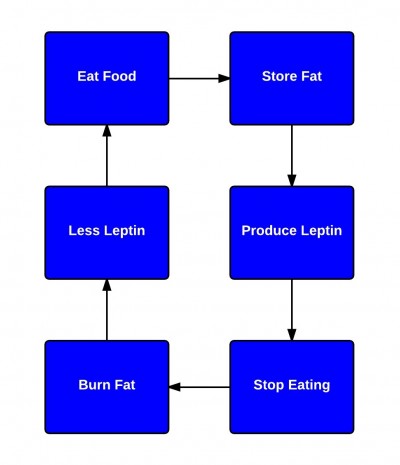The mainstream obesity witch hunt has already sentenced insulin to death, and now has another devil-worshipping hormone to railroad: leptin.
Often called the “obesity hormone,” leptin imbalances and dysfunctions are now being targeted as one of the leading drivers of fat gain in humans, which has, of course, given rise to all kinds of diets and supplements that claim to neutralize this hormone’s evil, fattening ways.
The first thing you need to realize about claims like these is this:
Weight loss advice that strays from or ignores completely the foundation of energy balance is almost always, as Shakespeare said, falser than vows made in wine.
You’re not going to eliminate the doughy evidence of years of overeating and under-moving by balancing a hormone or adding or removing certain foods from your diet.
Healthy weight loss isn’t complicated, but it requires self-discipline and effort; you’re going to have to regulate food intake and exercise for weeks or months, depending on how much fat you want to lose.
That said, like insulin, while leptin doesn’t have the power to “allow” or “disallow” weight loss, it can work for or against your efforts to get leaner, making the process easier or tougher.
Let’s find out why.
What is Leptin?
Leptin is a hormone produced by fat cells that has many functions in the body: regulating hunger, your metabolic rate, appetite, motivation, immunity, fertility, and libido, to name a few. Its main role, however, relates to the regulation of body weight.
In simple terms, leptin tells your brain that you have enough energy stored in your fat cells and that your body can expend energy at normal rates, including metabolically “expensive” functions like muscle growth or pregnancy, eat normal amounts of food, and engage in normal levels of physical activity.
If you restrict your calories to lose fat, leptin production decreases, which tells your body that it’s in an energy deficient state and that it needs to expend less and consume more. It accomplishes this through several mechanisms: reduction of basal metabolic rate and non-exercise activity, and stimulation of hunger, to name a few.
Here’s how the process works in a nutshell:

In healthy humans, this “feedback” loop works incredibly well and helps us maintain normal levels of body fat.
We get hungry, we eat until our body tells us its full, it stores some of the food as fat, we go about our day, expending energy and burning fat, our body tells us it needs more energy, we eat until full, and the cycle repeats.
As you can see, leptin itself is hardly an enemy–its goal is to prevent you from getting fatter and fatter over time. That said, we can turn leptin against us through poor eating and exercise habits…
Too Much of a Good Thing: Leptin Resistance
Obese people have high amounts of body fat, but guess what else they have an abundance of? That’s right–leptin.
The more energy stored in your fat cells (the fatter you are), the more leptin your body produces.
Why, then, are obese people often driven to eat so much? Why aren’t their brains sensing all the leptin in their blood and realizing that, holy shit, we don’t need food for a long damn time, and completely turning off hunger and the desire to eat?
The answer lies in what’s known as leptin resistance.
Like insulin resistance, leptin resistance is a condition wherein the body becomes less sensitive to leptin’s signals, which then plays havoc with the appetite and metabolism.
There are different theories as to how this works exactly, but the bottom line is this: leptin levels can be abnormally high but the brain thinks the body is in an energy-starved state and thus takes the actions mentioned earlier to increase energy intake and reduce output.
This “short circuits” the normal weight-maintenance process diagrammed above, and causes a vicious cycle:
- Eat food
- Gain fat
- Produce leptin
- Feel hungry
- Eat more
- Produce leptin
- Feel hungry
- Eat more
- Ad nauseam
In this way, leptin resistance causes overweight and obese people to naturally tend toward eating too much and moving too little, which causes them to get fatter and fatter. And as you can see, the best way to avoid falling into this trap yourself is never becoming overweight in the first place.
Think of obesity as a pit of quicksand filled with doughnuts and cheeseburgers. The more you eat, the more you weigh, the more you sink, and the harder it is to get out.
This doesn’t mean that overweight people are doomed, though. Reducing fat mass reduces circulating leptin levels and also appears to “restore” leptin sensitivity. Yes, they may have to battle hunger a bit more than other people, at least in the beginning, but this too normalizes in time.
This also explains one of powerful the biological drivers of “yo-yo dieting” (rapidly losing and re-gaining weight): a person starves himself, crashing leptin levels, and then finally can’t take the hunger and misery anymore and is compelled to regain the lost fat to restore physiological “balance.”
How to Restore Leptin Sensitivity
If you want to never have to battle weight issues, you want to maintain high levels of leptin sensitivity. This way your brain can simply do all the work for you, regulating your appetite to ensure you remain at a healthy body fat percentage.
Health and fitness marketers have jumped all over this and produced a glut of special diets and supplements meant to balance and optimize leptin levels, but like most fad diets and “wonder supplements,” it’s a bunch of bullshit.
Here’s the “hard truth”…
If you want to restore leptin sensitivity, you can’t be overweight.
There’s just no way around this. If you’re overweight and don’t bring your total fat mass down to a healthy level, you’re never going to be able to eliminate your leptin resistance problems and you’re always going to struggle with preventing further weight gain.
And this means you’re going to have to maintain a calorie deficit by regulating food intake, which means you’re probably going to have to give up some of your unhealthier habits like eating too much junk food and drinking too many calories.
Don’t worry though–losing fat is quite easy when you know what you’re doing. You get to eat the foods you like, you don’t have to suffer through mind-bending hunger or cravings, and you don’t have to do hours and hours of grueling exercise.
If you want to maintain leptin sensitivity, you need to commit to healthy living.
No, I’m not talking about sacrificing your taste buds to the cult of “clean eating,” I’m talking about engaging in regular exercise and ensuring you don’t chronically overeat.
That’s not a lot for your body to ask of you. Don’t stuff it with food it doesn’t need and don’t condemn it to death by inactivity.
Like insulin sensitivity, leptin sensitivity is simply a byproduct of taking good care of your body, and if you focus on getting healthy, it takes care of itself.
How to Boost Leptin Levels to Help With Weight Loss
For most people, the first couple months of a healthy weight loss diet is smooth sailing. They exercise regularly and maintain a proper calorie deficit and their body fat percentage neatly declines week after week.
Eventually, though, progress slows. Energy in the gym wanes and workouts get harder and harder. The body composition goal, which seemed in the bag just a month ago, now appears further and further away.
For most people, this is where they lose heart and fall off the wagon and binge. And then binge again. And again.
But there’s hope. And it doesn’t involve dropping your calorie intake to dangerously low levels or frying your muscles with excessive cardio.
Instead, the “trick” is something you’ll relish: occasional overfeeding. Yes, that’s right–eating a bunch of food. Not just anything and everything, though–there’s more to it than that. This weight loss aid is known as “refeeding,” and it allows you to manipulate leptin levels to help keep your weight loss efforts on tack.
Check out this article on refeeding to learn more.
What are your thoughts on leptin and weight loss? Have anything else to share? Let me know in the comments below!
+ Scientific References
- Reseland, J. E., Anderssen, S. A., Solvoll, K., Hjermann, I., Urdal, P., Holme, I., & Drevon, C. A. (2001). Effect of long-term changes in diet and exercise on plasma leptin concentrations. The American Journal of Clinical Nutrition, 73(2), 240–245. https://doi.org/10.1093/AJCN/73.2.240
- RR, W., MK, S., RV, C., W, L., & JF, C. (1996). Relationship between weight loss maintenance and changes in serum leptin levels. Hormone and Metabolic Research = Hormon- Und Stoffwechselforschung = Hormones et Metabolisme, 28(12), 698–703. https://doi.org/10.1055/S-2007-979881
- NL, K., JS, S., & PJ, H. (1998). Relation between circulating leptin concentrations and appetite during a prolonged, moderate energy deficit in women. The American Journal of Clinical Nutrition, 68(4), 794–801. https://doi.org/10.1093/AJCN/68.4.794
- W, H., M, C., R, L., M, R., & J, H. (2013). Effects of reduced weight maintenance and leptin repletion on functional connectivity of the hypothalamus in obese humans. PloS One, 8(3). https://doi.org/10.1371/JOURNAL.PONE.0059114
- RR, W., MK, S., RV, C., W, L., & JF, C. (1996). Relationship between weight loss maintenance and changes in serum leptin levels. Hormone and Metabolic Research = Hormon- Und Stoffwechselforschung = Hormones et Metabolisme, 28(12), 698–703. https://doi.org/10.1055/S-2007-979881
- RH, L. (2006). Childhood obesity: behavioral aberration or biochemical drive? Reinterpreting the First Law of Thermodynamics. Nature Clinical Practice. Endocrinology & Metabolism, 2(8), 447–458. https://doi.org/10.1038/NCPENDMET0220
- MG, M., SB, H., C, H., BB, K., M, L., RL, L., MH, T., & JA, Y. (2012). Challenges and opportunities of defining clinical leptin resistance. Cell Metabolism, 15(2), 150–156. https://doi.org/10.1016/J.CMET.2012.01.002
- RV, C., MK, S., ML, H., A, K., TW, S., MR, N., JP, O., CC, M., LJ, M., & TL, B. (1996). Serum immunoreactive-leptin concentrations in normal-weight and obese humans. The New England Journal of Medicine, 334(5), 292–295. https://doi.org/10.1056/NEJM199602013340503
- JA, L. (2004). Nonexercise activity thermogenesis (NEAT): environment and biology. American Journal of Physiology. Endocrinology and Metabolism, 286(5). https://doi.org/10.1152/AJPENDO.00562.2003
- GJ, H., & CR, B. (2010). Adipose tissue and the reproductive axis: biological aspects. Endocrine Development, 19, 31–44. https://doi.org/10.1159/000316895
- M, D., SH, C., K, S., P, P., SA, P., & CS, M. (2013). Leptin at the intersection of neuroendocrinology and metabolism: current evidence and therapeutic perspectives. Cell Metabolism, 18(1), 29–42. https://doi.org/10.1016/J.CMET.2013.05.010
- Davis, J. F. (n.d.). Adipostatic regulation of motivation and emotion - PubMed. Retrieved August 25, 2021, from https://pubmed.ncbi.nlm.nih.gov/20515615/
- JM, F., & JL, H. (1998). Leptin and the regulation of body weight in mammals. Nature, 395(6704), 763–770. https://doi.org/10.1038/27376
- JF, D., DL, C., & SC, B. (2010). Insulin, leptin and reward. Trends in Endocrinology and Metabolism: TEM, 21(2), 68–74. https://doi.org/10.1016/J.TEM.2009.08.004
- S, M., C, G., GG, P., & RA, H. (2002). Leptin: a review of its peripheral actions and interactions. International Journal of Obesity and Related Metabolic Disorders : Journal of the International Association for the Study of Obesity, 26(11), 1407–1433. https://doi.org/10.1038/SJ.IJO.0802142
- HK, P., & RS, A. (2015). Physiology of leptin: energy homeostasis, neuroendocrine function and metabolism. Metabolism: Clinical and Experimental, 64(1), 24–34. https://doi.org/10.1016/J.METABOL.2014.08.004











